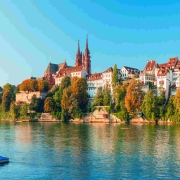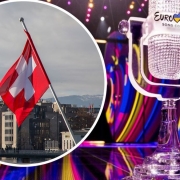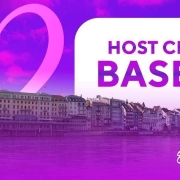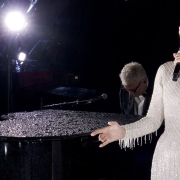Eurovision 2025: Outside the capital, the contest for the sixth year in a row!
An important tradition is built as to the city chosen by the EBU and the respective public broadcaster to host the Eurovision Song Contest. For the last six years the city called to host the annual music competition has not been the capital or the largest city of the country, effectively indicating the EBU’s intentions in this matter, for smaller, easier and more manageable cities.
How is the Eurovision host city chosen?
With the country that has won the contest – barring a shocking contingency (see Ukraine in 2022), taking on the honorable and at the same time demanding task of organizing and hosting the next Eurovision, the processes for choosing the most suitable city begin almost immediately.
The public broadcaster of the winning country sends to the cities concerned, a list of the required specifications that must be present, for the smooth implementation of the contest. It then sets a deadline for the cities that wish to claim the event to send their candidacy file. Afterwards, a shortlist is usually announced, with the best nominations.
These cities are visited by a team from the EBU, as well as from the winning public broadcaster, so that they can see the proposed facilities and discuss with the officials of each city, their plans and vision for the next Eurovision, in their city.
The final announcement date of the host city for the next competition varies. It may be in July, but it has also happened in October. Usually this is done in the last month of summer, August.
Decentralization in the last 6 years
What we notice with interest is that the last time the contest was hosted in the country’s capital was in 2018, when, as expected, Portugal chose Lisbon to host the Eurovision, after its first and only victory in the institution. Since then only countries that have already won have won and the capital or even the largest city of the country has never been chosen again.
More specifically, immediately after Netta’s victory for Israel, even though she herself, at the time of her crowning as the winner, was inviting the whole world to come to Jerusalem the following year for Eurovision, the EBU made it clear from the beginning that it was not going to be to accept the competition to be held in the Israeli capital. The reasons were many and mostly political. Jerusalem, which is also claimed by the Palestinians as their capital, but also as an extremely conservative city, was not the right choice for an event like Eurovision. In the end, Tel Aviv was chosen, having never hosted the competition before, despite Israel’s previous three victories.
In 2020, nine cities expressed their interest to host the competition, after the victory of Duncan Laurence, among them the capital Amsterdam. A little later, however, Amsterdam withdrew, since it had no space available to host the competition. Finally, the announced shortlist included Rotterdam and Maastricht, with the former winning the event. The 2020 contest was canceled due to the pandemic and Rotterdam eventually hosted Eurovision 2021.
Maneskin’s win in 2021 brought Eurovision to Italy. For the third time RAI was invited to organize the competition. More than 15 cities expressed their interest. In the end, only five were announced on the shortlist with the capital Rome, even though it had applied not to be included in them (Turin, Milan, Bologna, Rimini, Pesaro). The local press reported that the intense traffic problem of Rome and the difficulty in moving around, made the EBU and RAI not even choose it among the top five. Finally, Turin, which was the favorite from the beginning, hosted Eurovision 2022.
The victory of Ukraine and the ongoing war there, after the invasion of Russia, made it impossible to hold the next Eurovision there. Many countries were interested in organizing Eurovision 2023 on behalf of Ukraine (United Kingdom, Spain, Poland, Germany, Italy). Finally the EBU announced very early on that the UK and the BBC would co-organize with Ukrainian public television, the next competition. 20 cities from all over the country applied, including the capital London. Seven cities were then announced as the first shortlist and given a new deadline to present their nominations in more detail. Among these cities was not London, since according to the BBC and the government, their intention was to give this possibility and opportunity, to a regional city and not to the capital. In the end, the two most dominant cities were Liverpool and Glasgow, with the former being the surprise, since Glasgow was the favorite to host Eurovision 2023.
Loreen’s win brought the competition to Sweden for the seventh time. While all the fans were fervently supporting Stockholm, once again a smaller city was chosen rather than the capital. Four cities submitted official nominations, with two of them subsequently withdrawing. Malmö and Stockholm were the two final choices, with Malmö being chosen as essentially a one-way street, since Stockholm did not have an arena available and proposed in its bid to build a rough arena to hold the competition, which both the EBU and Swedish public television considered unsafe.
We come to this year. After Nemo’s victory, Switzerland is invited to host the competition for the third time in its history, with Lugano and Lausanne being the Swiss cities that have already hosted it in the past. Four cities have officially applied, including the capital Bern, but also the country’s largest city, Zurich. But neither was included in the final shortlist, which included Geneva and Basel. Within August we are now expecting the city to which we will travel next May in 2024. In the event that Basel is finally chosen, a city of only 170,000 inhabitants, it will be the second smallest city after Millstreet in 1993, to have hosted the competition for many decades.
Δείτε αυτή τη δημοσίευση στο Instagram.
Conclusions
It is reasonable to conclude that the EBU and the respective public broadcaster are now choosing smaller cities and not the capitals, since everything is easier and more economical. Hotels, transportation, security, etc. Of course, it always has to do with whether it is the country’s first victory in the competition, since then the choice of the capital, and for symbolic reasons, is more obvious.
However, a six-year tradition continues, which essentially shows the intentions and policy of the organizers in this matter, at a time when the competition is becoming more and more expensive, and security issues are also more pressing.
The selection of smaller and smaller cities and arenas is perhaps the future of Eurovision and indicative of the cities that will probably be chosen in the following years.
Stay tuned to Eurovisionfun for all the updates!










Leave a Reply
Want to join the discussion?Feel free to contribute!